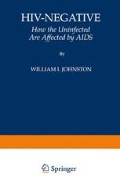Abstract
I was 22 when HIV testing became available in 1985, and I remember that I did not want to learn if I was infected. I did not want to know I had a potentially life-threatening illness. In the summer of that year, I spent a weekend with my parents on Cape Cod, Massachusetts. I had been working long hours at a summer job, so when I arrived in Dennisport, I was rundown. I felt achy, I had a burning sore throat, and the glands at the sides of my neck were swollen.
Access this chapter
Tax calculation will be finalised at checkout
Purchases are for personal use only
Preview
Unable to display preview. Download preview PDF.
Notes
For example, a 1991 Michigan survey of 1,689 men who have sex with men found that 514 had not been tested. The most common reasons for not testing were “I’m not at risk” (434 percent), “I’m not sure I could handle a positive test result” (34.4 percent), and “I don’t want to know the results” (26.1 percent). Less common reasons were “I was afraid that having the test might lead to discrimination against me” (22.6 percent), “I was worried that others would be told my test results” (14.6 percent), and “I don’t think the test has much value” (7.4 percent). Multiple responses were allowed. See Bureau of Infectious Disease Control and Midwest AIDS Prevention Project, HIV-Related Attitudes and Risk Behaviors among Men Who Have Sex with Men: Findings of the Fourth Michigan Survey (Lansing: Michigan Department of Public Health, 1992), p. 5 and table 12.
Similar results were found in 1990 surveys in Massachusetts and North Carolina. See AIDS Action Committee, Community Education Unit, A Survey of AIDS-Related Knowledge, Attitudes and Behaviors Among Gay and Bisexual Men in Greater Boston, Massachusetts: A Report to Community Educators (Boston: AIDS Action Committee, 1991), pp. 1, 27.
North Carolina Department of Environment, Health, and Natural Resources, Division of Epidemiology, An HIV-Related Community Assessment Survey of Gay and Bisexual Men in North Carolina: A Report to Community Health Educators (Raleigh, NC: Department of Environment, Health, and Natural Resources, 1993), pp. 11–12.
Discussions of the lack of positive correlation between HIV testing and risk reduction are found in the following essays, collected in The AIDS Epidemic: Private Rights and the Public Interest, ed. Padraig O’Malley (Boston: Beacon Press, 1989).
Marshall Forstein, “Understanding the Psychological Impact of AIDS: The Other Epidemic” Michael Gross, “HIV Antibody Testing: Performance and Counseling Issues” and Susanne B. Montgomery and Jill G. Joseph, “Behavioral Change in Homosexual Men at Risk for AIDS: Intervention and Policy Implications.”.
Author information
Authors and Affiliations
Rights and permissions
Copyright information
© 1995 William I. Johnston
About this chapter
Cite this chapter
Johnston, W.I. (1995). Considering Testing. In: HIV-Negative. Springer, Boston, MA. https://doi.org/10.1007/978-1-4899-6106-8_6
Download citation
DOI: https://doi.org/10.1007/978-1-4899-6106-8_6
Publisher Name: Springer, Boston, MA
Print ISBN: 978-0-306-44951-2
Online ISBN: 978-1-4899-6106-8
eBook Packages: Springer Book Archive

